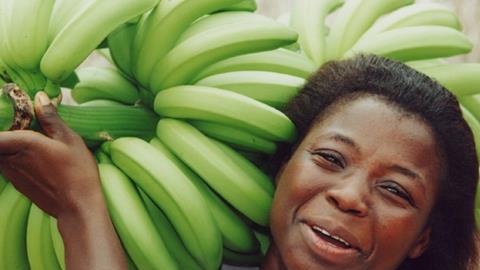Reefer Trends editor Richard Bright explores whether abandoning the import tariff on Latin American bananas would amount to a betrayal of producers in West Africa, as the Afruibana trade body contests
One of the consequences of the UK leaving the European Union in 2020 is that it is now able to set its own tariff and phytosanitary conditions for the entry of perishable products.
In November, the British government was accused of pursuing a tariff policy on bananas that could have a significant impact on the livelihoods of thousands of workers in several African countries, namely Cameroon, Ghana and the Ivory Coast.
According to the article in The Guardian, the UK is refusing to commit to an EU pledge to stop cutting tariffs on the dollar banana producing/exporting nations (across Latin America) – despite bananas being as cheap today as they were three decades ago.
The newspaper states correctly that the British market is already dominated by Latin American bananas, which benefit from rolled-over EU-negotiated free trade deals that have cut the tariffs on the fruit.
The EU promised in 2019 not to cut tariffs imposed on the big producers any further in recognition of the impact on the smaller African competitors. The UK’s exit has freed it from that pledge.
According to Afruibana, a Pan-African association of banana producers and exporters, the indications are that the result will be a “betrayal”, with the UK government ditching the EU promise.
The dollar banana is subject to a €75 per tonne import tariff, whereas all African, Caribbean and Pacific (ACP) bananas, which include West Africa, are tariff-exempt.
Banana tariff concessions have already been made in the last year to Mexico and Peru as part of the UK’s accession to the Comprehensive and Progressive Trans-Pacific Partnership (CPTPP).
The UK government is now engaging in a specific banana tariff review as part of its trade deal with the Andean countries – Colombia, Ecuador and Peru – which the African producers claim could ‘wipe out’ businesses in Ghana, Cameroon and Ivory Coast, countries whose economies, The Guardian claims, are among the least diversified in the world.
For perspective, the 10 major retailers in the UK account for approximately 90 per cent of all bananas sold. Latin American bananas dominate, with the three top suppliers – Colombia, Costa Rica and Ecuador – accounting for 62.7 per cent of the market.
The 11.5 per cent of the market held by African nations is said by Afruibana to provide more than 80,000 direct and indirect high-quality jobs and to sustain about half a million people in rural areas.
The African producers claim the move to cut costs for Latin American producers will not necessarily lower prices further for the British shopper, but will instead be pocketed farther up the line as the cost to the consumer is already so low.
The Afruibana allegation merits investigation and comment. Will the impact of the tariff removal be as cataclysmic as it suggests?
First the data: the UK imports approximately 900,000 metric tonnes of bananas per annum, of which African bananas account for approximately 100,000 MT. The import duty, or advantage, that ACP bananas currently have over dollar bananas stands at €75 per MT (£62), which is roughly equivalent to €1.39 (£1.15) per box. – In absolute terms that is €7.5m (£6.2m) per year.
These are not insignificant sums and, in the low-margin trading environment in the UK, it will make it more difficult for West African bananas to compete. All will depend on the UK retailers who have to decide whether to maintain current in-store pricing or pass the tariff reduction savings on to the consumer.
The decision by the UK, once made, shouldn’t come as a surprise. One of the advantages, indeed one of the stated aims behind Britain leaving the EU was that it would be able to manage its own trade arrangements.
Keen wherever possible to promote free trade, there are no commercial reasons for the UK government to impose tariffs on bananas – there is no banana industry to protect.
When the UK joined the EU, it was obliged to sacrifice preferential trading agreements with its ex-colonies in the Caribbean, Africa, Australia and New Zealand. This was a major contributing factor in the disappearance, over time, of the banana industries in Jamaica and the Windward Islands.
For comparison, banana production in the French West Indian islands (FWI) of Martinique and Guadeloupe is only viable because of the subsidies handed out to the French colonies by the EU.
The EU pays out close to €300m per year to safeguard its banana industries in the FWI and Canary Islands. However, it does not pay out to the Dominican Republic, which like the West African nations, will be affected by the UK government’s decision
In practical terms, the elimination of the duty on dollar bananas may result in the re-positioning of West African and Dominican Republic bananas from the UK onto EU markets, where they will continue to enjoy a tariff advantage over dollar fruit.
If so, this will have implications for both the Geest/Caribanex service from the Caribbean, and Compagnie Fruitière, by far the largest banana shipper from West Africa – as well as the latter’s chartering arm Africa Express Line and distribution from its ripening facility at London Gateway. The impact, however, will not be as severe as Afruibana suggests.




